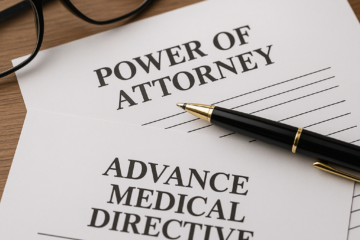Estate planning can often feel like navigating a maze, filled with misconceptions that can lead to costly mistakes. Many harbor myths about what estate planning entails, which can discourage them from taking necessary steps. In this blog, we will debunk some of these myths, providing you with a clearer understanding and empowering you in your estate planning journey.
1. Estate Planning is Only for the Wealthy
Many believe that estate planning is a necessity only for those with vast fortunes. In reality, it’s important for everyone—no matter the size of your estate. Essential components like a will or power of attorney can protect your assets and ensure your wishes are honored.
2. Wills and Trusts are the Same
Wills and trusts serve different purposes. While a will outlines your wishes after death, a trust can manage your assets during your lifetime and distribute them after you pass. Each has distinct legal and practical implications.
A will comes into effect only after you die, and it’s necessary to go through the probate process. On the other hand, a trust bypasses probate, offering privacy and avoiding court involvement. Understanding these differences can help you decide which tool, or combination of them, best suits your circumstances.
3. Once Created, Estate Plans Never Change
An estate plan should evolve with your life circumstances. Major life events like marriage, having children, or changes in assets necessitate updates to ensure your plan remains aligned with your current intentions.
Regular reviews and updates to your estate plan can prevent unintended outcomes and ensure that your assets are managed in accordance with your current desires. Legal changes and shifts in financial landscapes are also factors that might require revisiting your plans.
4. Estate Planning is Only for the Elderly
Procrastination is common due to the misconception that estate planning is meant for one’s twilight years. Yet, having a plan at any age is prudent, protecting against unforeseen events that could leave affairs in disarray.
Unexpected life events can happen at any time. Disasters, accidents, or sudden illnesses don’t discriminate. Early planning can safeguard your wishes and provide peace of mind, assuring you that your affairs are in order, no matter what life throws your way.
5. All My Assets Will Automatically Go to My Children
Assuming assets automatically transfer to children is risky. Without a will, state laws dictate distribution, which may not reflect your wishes. Formalizing your intentions ensures assets are allocated per your desire.
Without proper estate planning, your assets might not reach your children or be used as you intended. Protect your legacy by specifying your wishes clearly in a well-drafted will.
6. Only Large Estates Face Estate Taxes
While it’s true larger estates may face significant taxes, understanding the tax thresholds and planning can help mitigate liabilities, potentially benefiting estates of varying sizes.
By utilizing strategies such as gifting and charitable donations, you can reduce your estate’s taxable value during your lifetime. These tactics, along with others, can minimize tax burdens, safeguarding more of your wealth for the benefit of your heirs.
7. I Can Do Estate Planning on My Own
While DIY resources exist, estate planning involves complex legal and financial considerations. Consulting with a professional ensures you avoid pitfalls and create a comprehensive, legally sound plan.
Hiring a professional provides personalized guidance, especially helpful in navigating the intricacies of estate laws, which can vary significantly from one jurisdiction to another. Their expertise can be invaluable in crafting strategies that precisely meet your needs.
8. Estate Planning is Too Expensive
Perceived costs deter many, but not having a plan can lead to far greater expenses. The peace of mind and protection offered by a properly constructed estate plan are well worth the investment.
Comparing the upfront costs of estate planning to the potential expenses of probate and legal disputes without a plan underlines the value of professional guidance. Consider estate planning an investment in protecting your peace of mind and ensuring the best outcomes for your beneficiaries.
9. Healthcare Directives Aren’t Necessary
Neglecting healthcare directives can lead to confusion or conflict during medical crises. These documents outline your healthcare preferences, ensuring your wishes are followed when you cannot advocate for yourself.
A healthcare directive provides clear instructions to your family and medical team, reducing the emotional burden on loved ones who might otherwise be forced to make difficult decisions without guidance. It’s as much a gift to them as it is a safeguard for you.
10. I Don’t Need a Plan Because I Don’t Own Property
Estate planning encompasses more than property. It involves designating beneficiaries for various assets, addressing healthcare wishes, and appointing trusted individuals for decision-making.
11. My Family Will Know My Wishes Without a Plan
Assuming family members will intuitively understand your wishes is risky. A formalized plan ensures clarity, reducing confusion and potential disputes among loved ones.
Without a clearly articulated plan, misinterpretations can lead to family disagreements, potentially fracturing relationships. Establishing a formal plan benefits everyone, providing peace of mind and preventing misunderstandings.
12. Estates Automatically Avoid Probate
Probate processes can be time-consuming and costly. However, tools like trusts can help streamline or circumvent probate altogether, making estate distribution more efficient.
By transferring your assets into a trust, you effectively remove them from the probate process. This can provide quicker distribution to your beneficiaries, save money on court costs, and keep your financial matters private.




0 Comments